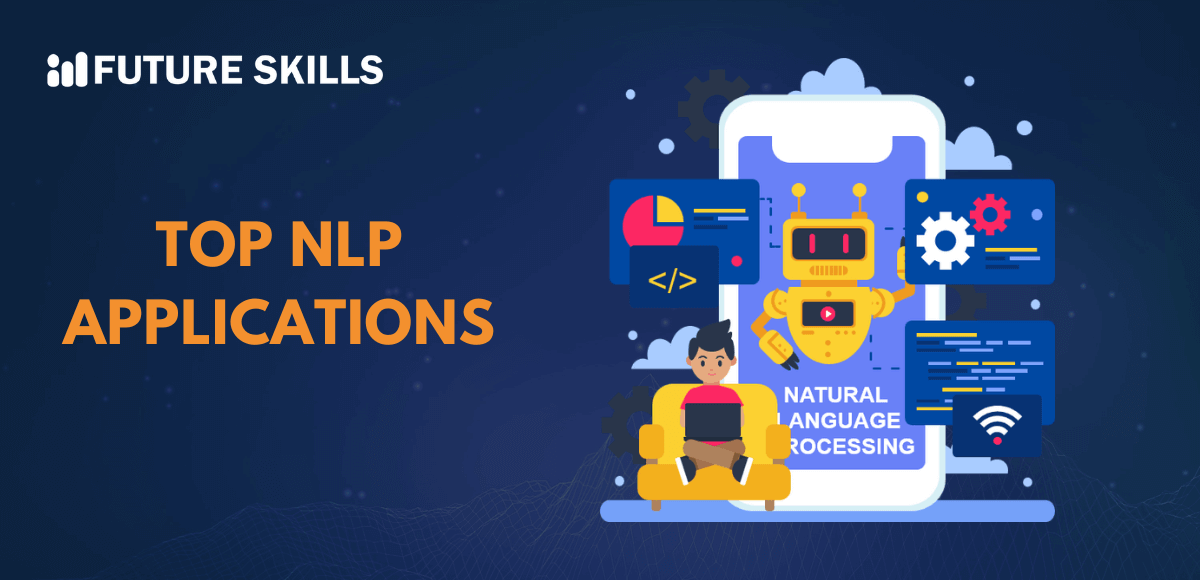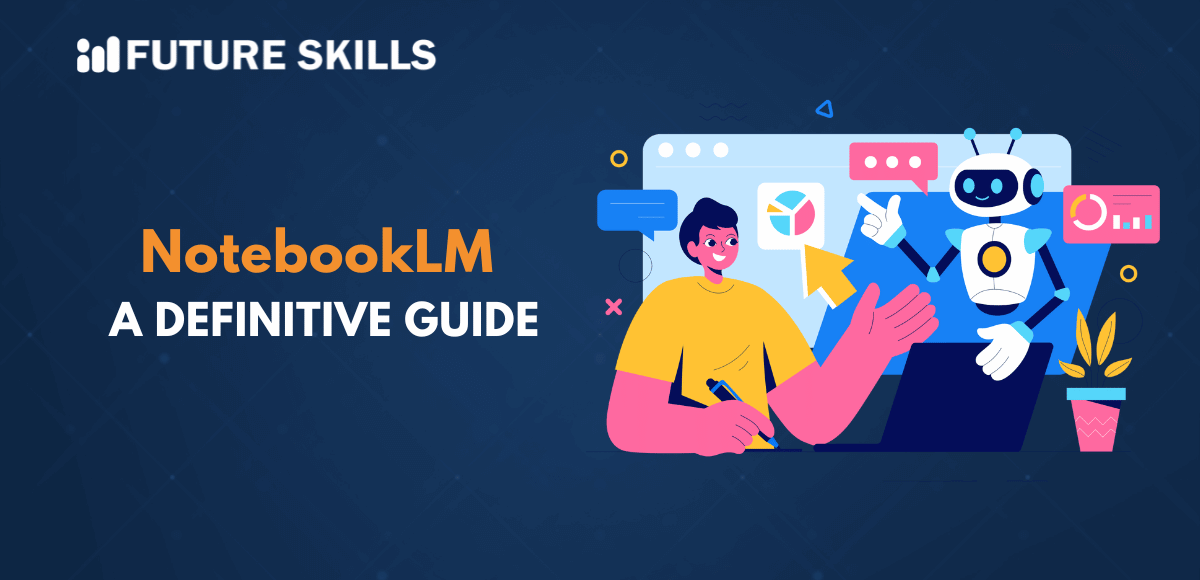Natural language processing is one of the most important subdomains of AI, and it has helped bring AI the mainstream popularity it enjoys today. Google states that NLP leverages machine learning to reveal the structure and meaning of text. Businesses can use applications of natural language processing in different ways to analyze voice and text data. For example, NLP is the core element in social media sentiment analysis.
The global NLP market might cross beyond $140 billion by 2033 in terms of market capitalization. Natural language processing has the potential to help businesses make sense of the massive amounts of unstructured data, such as survey replies, social media interactions, voice calls, and online chats. Let us discover some of the common examples of NLP applications and their significance in real life.
Definition of Natural Language Processing
The best way to begin your search for the top NLP applications involves learning the definition of NLP. Natural Language Processing leverages a combination of rule-based modeling of human language or computational linguistics and machine learning models. Its primary goal is to help a computer or digital device identify, understand, and respond to natural language queries like another human being.
The discussions about queries like “What are the main applications of NLP?” have been gaining momentum due to the rising mainstream applications of NLP. For example, it is the most important subdomain of AI at the heart of devices and applications that respond to spoken or typed commands. Whether it is translating text or summarizing large paragraphs of text, natural language processing has created new avenues for productivity.
The best thing about NLP is that its applications work in real time. Most of you would have interacted with NLP applications in real life, such as digital assistants or voice-operated GPS systems. On top of it, natural language processing also serves a critical role in developing enterprise solutions that can help streamline and automate business operations. NLP can also ensure simplification of mission-critical business processes and enhancements in employee productivity.
Build ChatGPT skills and take the first step to becoming superhuman with our free ChatGPT and AI fundamental course
What are the Top Applications of Natural Language Processing?
The way humans can understand real-world context, intent, formal rules, slang, and other elements of natural languages is something machines cannot do. Natural language processing has the capability to solve this problem alongside augmenting the capabilities of AI applications in the real world. Here is an outline of the different applications of NLP in real life.
-
Search Results
Search engines are one of the most popular NLP applications as they can utilize natural language processing to deliver results according to specific search behaviors or user intent. Google can predict the popular searches applicable to a user’s query as they start typing. However, it also offers many other suggestions, indicating that it takes the broader picture into account.
The variations you find in the search suggestions are due to the applications of NLP in search. Natural language processing helps in mapping ambiguous queries to a relative entity and offers the most useful results.
-
Speech Recognition
Speech recognition is also another notable application of natural language processing. It serves as a useful technology for transcribing human voice into digital files. The answers to “What are the main applications of NLP?” also suggest that virtual assistants can use speech recognition for a wide range of tasks. For example, virtual assistants can send emails, understand voice commands, and translate speech to text.
Natural language processing decodes the spoken words and makes the conversation with virtual assistants as natural as possible. Speech recognition applications utilize advanced algorithms for analysis of vocal patterns and conversion of spoken words to machine-readable data. The process also leverages processes language modeling for effective understanding of speech queries.
Excited to understand the crucial requirements for developing responsible AI and the implications of privacy and security in AI, Enroll now in the Ethics of Artificial Intelligence (AI) Course.
-
Email Filters
Email filters are also one of the most notable applications of natural language processing. It is the best application of NLP that has been helping users for a long time. The initial application of NLP began with spam filters that helped uncover certain words and phrases that indicate a spam message. However, email filters have undergone major upgrades, such as the early versions of natural language processing applications.
The Gmail email classification system is one of the best examples of the use of NLP in email filters. It can recognize whether the emails belong in the categories, such as primary, promotions, or social, according to the content. Therefore, Gmail users can have a more organized inbox with an easier way to identify emails that they want to respond to.
-
Sentiment Analysis
Another notable addition to top NLP applications points to sentiment analysis. It is an important application of natural language processing as it bridges the communication gap between machines and humans. Sentiment analysis can help computers and digital devices understand sentiment in human communication, such as threats and sarcasm. It is useful for understanding the emotional undertones in communication, thereby helping businesses with effective resolution of social media disputes.
On top of that, NLP also helps businesses gain an effective understanding of customer reactions. Sentiment analysis algorithms dive deeper into intricacies of natural language to recognize positive and negative sentiments alongside complex emotions. The algorithms can work on different tasks, such as parsing contextual cues, categorization of sentiments, and identification of emotional triggers.
Enroll now in the AI for Business Course to understand the role and benefits of AI in business and the integration of AI in business.
-
Language Translation
Natural language processing applications in language translation can also help break down language barriers. It is one of the revolutionary applications of natural language processing that can help businesses tap into the full potential of social media. NLP powers machine translation that can streamline global conversations through interpretation of diverse languages. Some of the notable social media platforms, such as Instagram and Facebook, leverage the power of translation software to enable seamless communication between users worldwide.
NLP utilizes complex models for language translation, which account for different factors, such as semantics, context, and syntax, to ensure accurate translation. Most importantly, natural language processing ensures that language translation systems preserve the meaning and essence of content in different languages.
-
Data Analytics
The applications of NLP have also penetrated the domain of data analytics. One of the best examples of NLP applications in real life in the domain of data analytics is the integration of NLP capabilities in data analysis workflows. BI vendors have been offering simple natural language interfaces for data visualizations. For example, users can access smarter visual encodings that offer the ideal visualization for the ideal task according to semantics.
Integration of NLP with data analytics can open new opportunities for exploring data by using natural language queries. The use of natural language for investigation of data improves the level of accessibility to data analytics tools and insights. As a result, everyone beyond the community of software developers or analysts can also understand and leverage data analytics.
Embark on a transformative journey into AI, unlocking career-boosting superpowers through our Certified AI Professional (CAIP)™ Certification program.
-
Text Summarization
The responses to queries like “What are the main applications of NLP?” also point to text summarization. It helps simplify the vast collections of data that you can find in research papers, news, and articles. The text summarization capabilities of NLP dig through intricate patterns in data, thereby supporting social media analytics and investigative discovery.
Natural language processing applications in text summarization help extract key information, condense content, and recognize critical insights in text. The advantages of NLP in text summarization can help in effective use of information across different domains.
-
Predictive Text
Another common yet best application of NLP in real world is predictive text. Most smartphone users must have used predictive text, autocorrect, or autocomplete features. The autocomplete and predictive text features in smartphones are similar to the way search engines work. The features use NLP to predict what you want to type by suggesting relevant words and phrases.
Autocorrect feature can use NLP for changing words to ensure that the overall message in a communication makes sense. The devices also learn, and predictive text can be customized to the personal language quirks with continuous usage.
-
Targeted Advertising
Natural language processing can also play a vital role in empowering businesses for lead generation through targeted advertising. NLP can help in placement of the right advertisements at the right time and the right place. The applications of NLP in targeted advertising involve comprehensive keyword analysis and detailed investigation of patterns in user interactions across the internet, social media platforms, and emails. Natural language processing also leverages text mining to perform targeted advertising.
Final Words
The overview of different applications of natural language processing in real life shows the extent to which AI has become an important part of our everyday lives. NLP is a prominent subfield of artificial intelligence that helps in bridging the gap between humans and machines. It can help offer new approaches to productivity for businesses alongside simplifying people’s everyday lives.
Therefore, natural language processing can emerge as a promising tool for professional development with new career opportunities. For example, NLP engineering is one of the most popular job roles in the AI landscape. Learn more about the fundamentals of NLP and how it can help you explore new avenues for career development.






